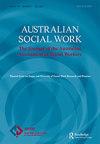A Program for Valuing Mental Health Lived Experience in Social Work Education
IF 1.6
3区 社会学
Q2 SOCIAL WORK
引用次数: 2
Abstract
ABSTRACT Participation and involvement of service users, carers, and families into the design, delivery, evaluation, and development of mental health policy and services is now a standard expectation. As social workers are employed in mental health settings, it is vital that graduates understand and ethically engage with mental health consumers, survivors, ex-patients, and family (CSX + F) in a meaningful and authentic manner. We argue this extends to fostering critical understandings of dominant discourses about distress, trauma, diagnosis, and intervention as a routine component of social work education. The Valuing Lived Experience Program (VLEP) described in this article within the Curtin University School of Allied Health aims to meaningfully embed the voices of people with lived experience of mental distress, trauma, and service use into the education of tertiary students and academics. Lived experience education in social work is vitally important and requires appropriate resourcing, clear purpose and principles, and attention to the democratisation of knowledge in order to achieve epistemic justice. In this article, the authors describe and contextualise the VLEP as a contemporary example of how lived experience in social work education can occur and be developed. IMPLICATIONS Meaningful participation of people with mental health lived experience is important to social work education. Lived experience education needs to be underpinned by clear ethical and theoretical principles for teaching and learning. Programs that rigorously engage with lived experience in mental health education can make a positive contribution to critical understandings of mental distress.社会工作教育中重视心理健康生活体验的方案
服务使用者、护理人员和家庭参与精神卫生政策和服务的设计、提供、评估和发展,现在是一个标准的期望。由于社会工作者受雇于心理健康机构,因此毕业生必须以有意义和真实的方式理解并合乎道德地与心理健康消费者、幸存者、前患者和家属(CSX + F)进行接触。我们认为,这可以扩展到培养对主流话语的批判性理解,这些话语是关于痛苦、创伤、诊断和干预的,是社会工作教育的常规组成部分。本文描述的科廷大学联合健康学院的“重视生活经验计划”(VLEP)旨在将有精神痛苦、创伤和服务使用生活经验的人的声音有意义地嵌入到大学生和学者的教育中。社会工作中的生活经验教育至关重要,需要适当的资源,明确的目标和原则,并注意知识的民主化,以实现认识正义。在这篇文章中,作者将VLEP描述为当代社会工作教育中生活经验如何发生和发展的一个例子。意义有心理健康生活经验的人有意义的参与对社会工作教育很重要。生活经验教育需要以明确的教与学伦理和理论原则为基础。在心理健康教育中严格结合生活经验的项目可以为对精神痛苦的批判性理解做出积极贡献。
本文章由计算机程序翻译,如有差异,请以英文原文为准。
求助全文
约1分钟内获得全文
求助全文
来源期刊

Australian Social Work
SOCIAL WORK-
CiteScore
4.20
自引率
16.70%
发文量
37
期刊介绍:
Australian Social Work is an international peer-reviewed journal reflecting current thinking and trends in Social Work. The Journal promotes the development of practice, policy and education, and publishes original research, theoretical papers and critical reviews that build on existing knowledge. The Journal also publishes reviews of relevant professional literature, commentary and analysis of social policies and encourages debate in the form of reader commentary on articles. Australian Social Work has grown out of the Australian context and continues to provide a vehicle for Australian and international authors. The Journal invites submission of papers from authors worldwide and all contributors are encouraged to present their work for an international readership.
 求助内容:
求助内容: 应助结果提醒方式:
应助结果提醒方式:


